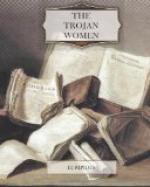So the days waned, and armies on the shore
Of Simois stood and strove and died. Wherefore?
No man had moved their landmarks; none had shook
Their walled towns.—And they whom Ares
took,
Had never seen their children: no wife came
With gentle arms to shroud the limbs of them
For burial, in a strange and angry earth
Laid dead. And there at home, the same long dearth:
Women that lonely died, and aged men
Waiting for sons that ne’er should turn again,
Nor know their graves, nor pour drink-offerings,
To still the unslaked dust. These be the things
The conquering Greek hath won!
But we—what pride,
What praise of men were sweeter?—fighting
died
To save our people. And when war was red
Around us, friends upbore the gentle dead
Home, and dear women’s heads about them wound
White shrouds, and here they sleep in the old ground
Beloved. And the rest long days fought on,
Dwelling with wives and children, not alone
And joyless, like these Greeks.
And Hector’s woe,
What is it? He is gone, and all men know
His glory, and how true a heart he bore.
It is the gift the Greek hath brought! Of yore
Men saw him not, nor knew him. Yea, and even
Paris[23] hath loved withal a child of heaven:
Else had his love but been as others are.
Would ye be wise, ye Cities, fly from
war!
Yet if war come, there is a crown in death
For her that striveth well and perisheth
Unstained: to die in evil were the stain!
Therefore, O Mother, pity not thy slain,
Nor Troy, nor me, the bride. Thy direst foe
And mine by this my wooing is brought low.
TALTHYBIUS (at last breaking through the spell that has held him).
I swear, had not Apollo made thee mad,
Not lightly hadst thou flung this shower of bad
Bodings, to speed my General o’er the seas!
’Fore God, the wisdoms and the greatnesses
Of seeming, are they hollow all, as things
Of naught? This son of Atreus, of all kings
Most mighty, hath so bowed him to the love
Of this mad maid, and chooseth her above
All women! By the Gods, rude though I be,
I would not touch her hand!
Look thou; I see
Thy lips are blind, and whatso words they speak,
Praises of Troy or shamings of the Greek,
I cast to the four winds! Walk at my side
In peace!... And heaven content him of his bride!
[He moves as though to go, but turns to HECUBA, and speaks more gently.
And thou shalt follow to Odysseus’ host
When the word comes. ’Tis a wise queen[24]
thou
go’st
To serve, and gentle: so the Ithacans say.
CASSANDRA (seeing for the first time the Herald and all the scene).
How fierce a slave!... O Heralds, Heralds!
Yea,
Voices of Death[25]; and mists are over them
Of dead men’s anguish, like a diadem,
These weak abhorred things that serve the hate
Of kings and peoples!...




